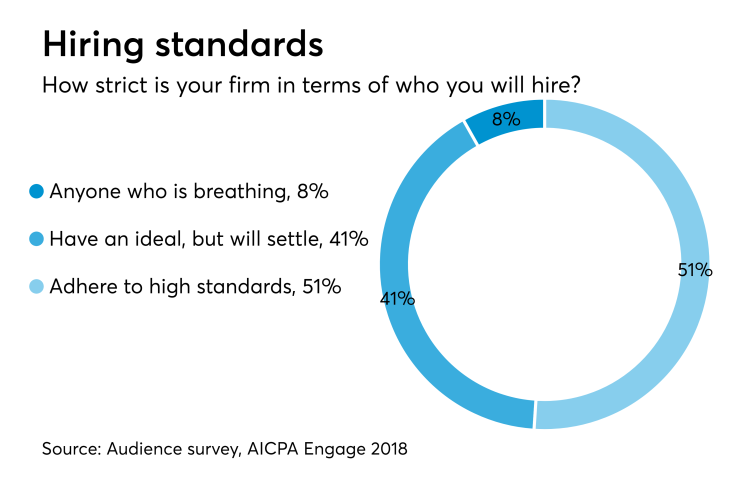What do registered nurses, management consultants and IT programmers have to do with public accounting? New employment opportunities, according to the managing partners of BKR International firms who are expanding their approach to business advisory and attest services.
One of the big practice management topics these leaders have discussed for 2019 is the expansion of sophisticated niche services that require specialized skills not traditionally found among CPAs. These include, but are not limited to, valuations, M&A consulting, IT consulting and government contracting.
We are seeing a move toward carving out compliance services into separate entities and focusing firms’ growth potential in high-level advisory services. With this change of focus comes more stability for independent firms to grow organically, as well as through M&A. To attract candidates who don’t come from public accounting, BKR leaders talked about three factors that are making this industry more appealing to non-accounting graduates or second-career professionals.
In-house technology
Right now, firm leaders are debating whether to outsource more of their IT needs to specialists or build a strong IT base inside their firms that can benefit both their team and their clients.
Several firms already offer clients services such as software selection, solutions integration, network management and staff training. Expanding their team to include programmers, data analysts and cybersecurity professionals will add to their firms' ability to build custom solutions, deliver better reports and improve client security.
Baltimore-based Gross Mendelsohn & Associates has offered technology services to clients through CPAs with a technology focus since 1993. As client needs evolved, however, the Gross Mendelsohn Technology Solutions Group has been identifying areas where accounting experience can be valuable, but is not critical.
“After starting by providing accounting system-related services, clients started asking us to help them with their networks, probably because as their CPA, they trusted us,” said David Goldner, managing partner of Gross Mendelsohn. “So we began to hire people who help clients support their networks. They are non-CPA network engineers. More recently, we have added programmers and systems professionals who can customize client solutions, such as CRM and ERP systems, for more tailored reporting and integration.”
It’s a matter of scale when looking at non-accounting hires, Goldner added. While the firm isn’t planning to hire a six-figure manufacturing consultant any time soon, there is added client value in offering services in disciplines where they have developed strong expertise, such as human resources, into client services. “We support hiring of financial professionals along with helping clients with the maze of complex HR regulations and compliance,” he said.

Client knowledge base
For firm services in highly regulated industries such as government contracting or health care, for example, the stringent quality control and compliance requirements are demanding more of a “boots on the ground” view of the industry to deliver faster on client expectations.
Government contractors or health care CFOs can’t necessarily wait for an accounting firm to catch up to their needs, so firms are hiring specialists who range from GSA proposal consultants to medical professionals.
In the past year, Bland & Associates, based in Omaha, Nebraska, has hired several non-CPAs to support the firm’s growing Government Consulting Group serving the Centers for Medicare & Medicaid Services. Managing partner Jeremy Vokt outlined their strategy this way: “We’ve had to look at the projects and tasks through the eyes of being a consultant as well as a CPA. We want to provide value outside of the accounting world as we expand on our service offerings. That has led to hiring C-level people ranging from health care providers and management-level staff from health insurance companies to also professionals with varying backgrounds: programmers, compliance analysts, and even registered nurses.”
When these professionals work in tandem with the firm’s CPAs, it raises awareness and context as to how new programs and audit processes will impact the industry, as well as quality outcomes for the public, Vokt added. “This approach has transformed our competitive advantage," he said.
Forecasting
Public accounting firms must now balance client needs for compliance and historical reporting with client desires for more forecasting and strategic planning support. This opens up opportunities to consider and attract professionals who can work behind the scenes on needs such as M&A strategies, “Opportunity Zone” consulting or human resources management.
There may even be opportunities in the future to hire professionals who consult on a client’s “social impact” or “renewable energy scorecard” as it relates to their bottom line and tax incentives. Of course, these specialists will need to be trained to work in the public accounting space and adhere to both ethical and regulatory standards on the accounting and client side. That’s a whole other important topic.
Nevertheless, the range of business advisory services emerging for the profession is not exhausted. Public accounting leaders who open their minds to hiring beyond accounting and CPA professionals — when and where it makes fiduciary sense — will enrich their technology, client knowledge and forecasting capabilities as new client needs emerge. This is the next wave of competitive recruitment.





